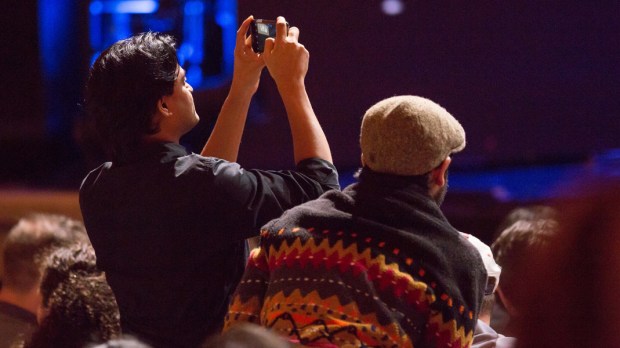Lenten Campaign 2025
This content is free of charge, as are all our articles.
Support us with a donation that is tax-deductible and enable us to continue to reach millions of readers.
Okay, this article had me giggling a little. According to the New York Post, Broadway actors are becoming increasingly indignant about the rude audience members who are destroying their performances.
Badly behaved audiences are all too common on Broadway. Phones ring, screens glow as people text, wrappers crinkle. And now that theatergoers can drink alcohol during many shows, they fidget, rattle the ice in their cups, nod off and, snore, or laugh in all the wrong places. Many actors object to the drinking, but they have no power over theater owners, who enjoy the fat profits that come from $20 glasses of wine.
I did theater all through middle and high school and didn’t abandon it entirely until my junior year in college, when my love of poetry won out over my love of acting. So I get what these actors are complaining about — it does take effort to build a certain atmosphere, and it’s frustrating when the audience clearly isn’t in that atmosphere with you.
But I’ve also had the absolute privilege of witnessing the birth of Ave Maria University’s Shakespeare in Performance troupe, a group of mostly novice actors who perform full-length Shakespeare plays in a classroom, under fluorescent lights, with the audience positioned around them on three sides. They do this on purpose, because this is how plays were performed in Elizabethan England.
But they’re not just going for authenticity. They use the proximity of the audience and the purposeful lack of a fourth wall to draw the audience in. They’ll do things like aim Shakespeare’s sick burns at specific professors in the audience, or pull audience members onstage and position them like trees behind which to hide. And then leave the audience member to decide when is the right time to go sit back down.
On the rare occasion that an audience member is whispering or unwrapping, an actor will do things like try and join the whispered conversation or ask for (and sometimes receive) a bite of the crinkly-wrapped food. The proximity to the stage and the fact that the audience has a clear sight of not only the actors, but also each other, tends to put people on their best behavior. But the sure knowledge that bad behavior will be called out is pretty potent enticement to not behave badly.
All this interaction with the audience serves another purpose though. It literally pulls the audience into the play, so they see the spit flying from Leontes’ mouth as he descends into madness and feel the despair of Hermione as she collapses. The audience weeps with Hero and shares Beatrice’s wrath as well as Benedick’s agony. They feel the magic and mischief of Puck and laugh helplessly as Titania falls in love with Bottom.
In short, the audience inhabits the atmosphere of the play because the actors have drawn them into the creation of it.
Which is not to say that Broadway actors don’t do the same, but the modern architecture of the theater makes it much more difficult. The audience is farther away, shrouded in darkness, and used to the anonymity of a movie theater. In the Post article, the actors all describe various situations in which they silenced rude audience members during the play as if those were notably unfortunate events — but I don’t think they have to be seen that way. Part of theater is education, after all, and what better way to educate your audience than by breaking that fourth wall and telling them what behavior is or isn’t acceptable?
In any case, I have to wonder exactly how much the audience in these plays has in fact been drawn into the atmosphere the actors have created, and how much the actors have created an atmosphere for themselves without successfully drawing the audience in. That is, after all, part of the actor’s task — not just to build a world, but to build a world and bring the audience into it. If that task is becoming impossible, maybe it’s time to destroy the fourth wall, bring back gallant stools, and keep the house lights up.

Read more:
Minding our manners: How WhatsApp is making us rude

Read more:
A Millennial guy’s guide to holding the door open

